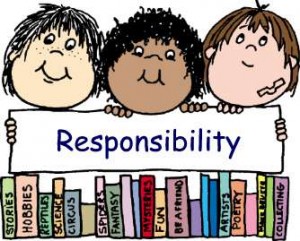
Traditionally, the beginning of the year is a time when we try to adopt new, better habits. On average, about one third of Americans resolve to lose weight each new year. (No wonder the gym is always so much more crowded in January!) Statistically, though, about 80 percent of those well-meaning resolutions will have been abandoned by February. Why? Well, it’s hard to make major changes to the way we are used to behaving, and even harder to make them overnight. Learning to be healthy takes practice and discipline, and it isn’t always easy, even when we know that eating right and exercising regularly are good for us.
The same goes for raising children to be responsible and accountable for their actions. A sense of responsibility isn’t something we’re born with, and it isn’t something that can be taught in one moment. Parents Magazine compares responsibility to manners – it’s a “learned behavior.” That means that as parents, we’re responsible ourselves for making sure we help our children develop an understanding of how important it is to take accountability for their actions. We can do that by giving them age-appropriate responsibilities and providing incentives and consequences for different kinds of behavior.
Chores & tasks
Giving children responsibilities around the house is a great way to teach accountability and show them how their actions can positively impact others. Even small children can start to learn responsibility by helping to pick up their own toys or clear the table. This article provides some good suggestions for ways to realistically and constructively involve kids in deciding what chores they do and how they ought to be done.
Follow through
If we tell a child to expect a consequence for a certain action and then don’t apply that consequence, we lose an opportunity to teach accountability. For example, if the rule is you can’t have dessert unless you eat all your vegetables, but we give our children ice cream even though they left all their broccoli and cauliflower on the plate, what we’re really teaching them is that the vegetable rule doesn’t really matter. The best consequences in the world are completely ineffective if they’re never applied. The same goes double for incentives: If you promise a child a reward for a certain good behavior, make sure you come through when the reward has been earned. We have to follow through if we really want our children to learn that their actions have consequences that they can control by being responsible for their own behavior.
Responsibility and camp
Accountability and responsibility are a big part of the summer camp experience. Campers have daily age-appropriate responsibilities that teach them accountability and help them develop healthy independence, and counselors and other staff members are trained to help campers understand how their own actions affect themselves and others.
When your daughter is coming to camp for the first time, it’s a good idea to prepare her for the fact that she will have certain responsibilities at camp, such as making her bed and helping clear the table at meals. Her camp responsibilities may be different from her home responsibilities, but they are just as important; they help camp run smoothly for everyone. As she gets older, she will have more responsibilities at camp, such as having a Peanut Daughter, leading a Junior Camp activity day, and someday captaining a Color War team — a big responsibility, but one that she’ll be ready for after years of practice!
